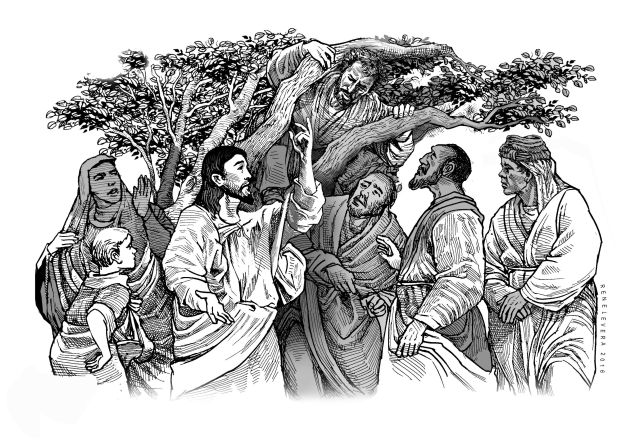
In the midst of a crowd, I have trouble watching an event because of my height. I would need to stand on something raised or join a group of people shorter than me.
Fortunately, at weddings, during the regulation photographs, I get assigned to the front, perhaps because of my age, and because I hardly attend a wedding unless invited as a sponsor.
In one of these sessions years ago, I imagined a short man whom nobody noticed, and who could not insert himself among the other taller guests for the group picture. In desperation, he snatched a bouquet of mums from the altar, and, at the moment when the photographer clicked the camera, jumped high enough for the lens to catch his raised hand holding the flowers. And perhaps, all his life, whenever anyone looked at the wedding picture and tried to find him there, he would point to the hand of someone at the back of the group holding the flowers above the heads.
Something roughly similar happened in Luke’s account of Zacchaeus in his Gospel. As Jesus was passing through Jericho, Zacchaeus, a chief tax collector and a wealthy man, wanted to see who Jesus was, and, because Zacchaeus was short of stature, climbed a sycamore tree to get a good view. When Jesus reached the place, he saw Zacchaeus and said to him, “Zacchaeus, come down quickly, for today I must stay at your house.” Luke writes that Zacchaeus descended quickly and received Jesus with joy.
When they saw this, the people grumbled, “He has gone to stay at the house of a sinner.” To this Zacchaeus replied, addressing the Lord, “Behold, half of my possessions, Lord, I shall give to the poor, and if I have extorted anything from anyone I shall repay it four times over.” And Jesus said to him, “Today salvation has come to this house because this man too is a descendant of Abraham. For the Son of Man has come to seek and to save what was lost.”
Zacchaeus’ smallness was not just physical, but also moral, in that the others regarded him, a tax collector, as a sinner, since he worked for the Romans and who likely as not engaged himself in less than honorable financial activities. But Jesus’ call changed him and inspired him to make amends.
In his introduction to the book, “The Time of the Church according to Augustine,” by Dom Giacomo Tantardini, then Cardinal Jorge Mario Bergoglio wrote that, for him, the image of how one becomes a Christian is that of Zacchaeus, of whom Augustine said, Et vidit Dominus ipsum Zacchaeum. Visus est, et vidit (And the Lord looked at Zacchaeus himself. Zacchaeus was seen, and therefore saw.)
According to the author of the book, Don Giacomo, having climbed up the sycamore tree, Zacchaeus would have seen Jesus even if Jesus did not raise his eyes, “but it would not have been a meeting.” On this Bergoglio commented, “The Lord will look for you first. And when you find Him, you understand that He was waiting there looking at you. He was expecting you from beforehand.”
The French artist James Tissot included in his painting of the scene, “Zacchaeus in the Sycamore Awaiting the Passage of Jesus,” other people atop trees, wanting to view Jesus as well.
Tissot merely brought to the foreman’s curiosity, his tendency to gaze at someone popular, and Zacchaeus might have taken his cue from those who had clambered up a tree ahead of him.
But Jesus only called Zacchaeus and not the others, perhaps because, as the Lord said, “the Son of Man has come to seek and to save what was lost.” In the crowd, Zacchaeus might have needed salvation the most. And while the others just looked at Jesus, Zacchaeus actually encountered him. It was because Jesus had seen him that Zacchaeus saw Jesus.
In that wedding picture, seeing the diminutive guest’s futile efforts to slip into the front and be within camera range, the photographer might have taken pity and called him to the front, urging the others to give place to him. Or else, he might find it serendipitous that, when he clicked the camera, a bouquet of chrysanthemums miraculously rose from behind the guests, and might have taken it as a sign of the marvelous.